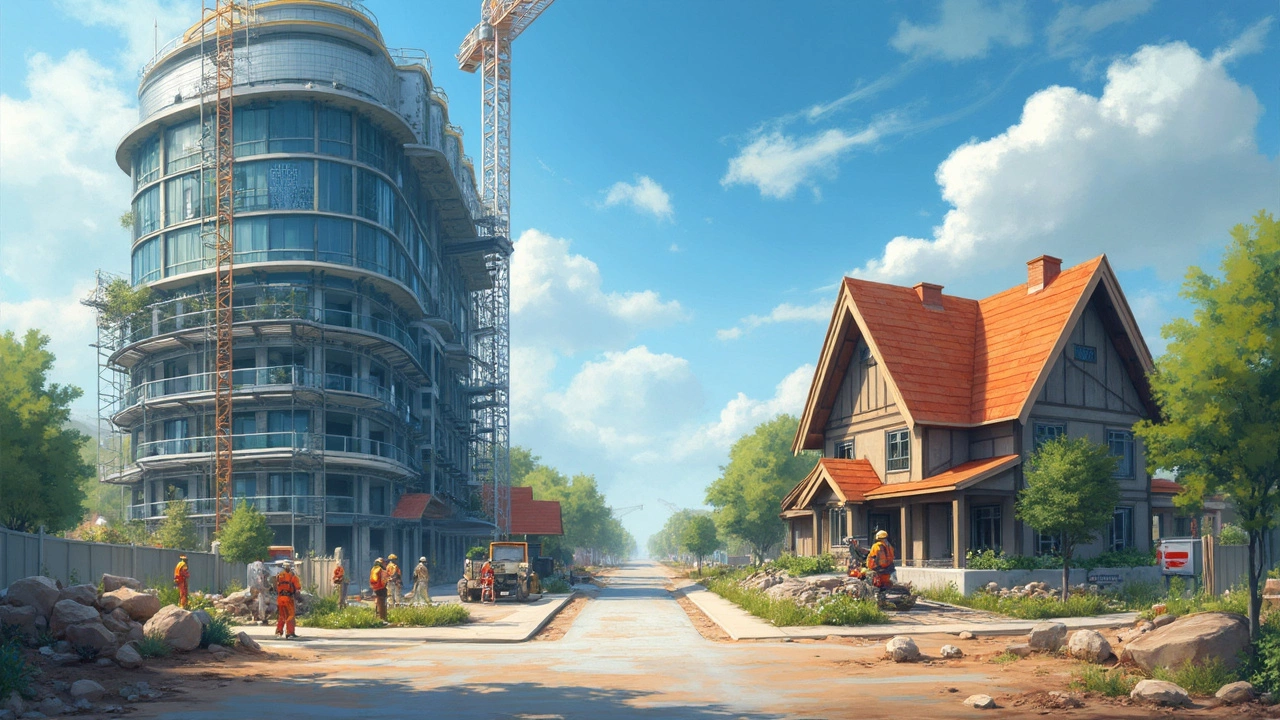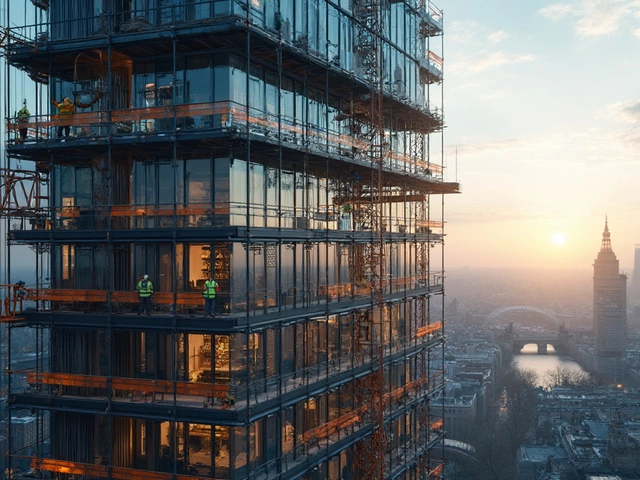When you're trying to figure out whether commercial or residential construction is the way to go, it’s crucial to understand what each type involves. Commercial construction usually includes buildings like offices, retail centers, and other facilities that serve a business purpose. Residential construction, on the other hand, is all about homes, be it single-family houses, apartments, or condos. Each comes with its own set of rules and quirks!
Have you ever noticed how different a shopping mall feels from your friend's house? It's not just the vibe that's different—commercial and residential construction follow different building codes and regulations. For commercial spaces, developers need to consider things like accessibility, emergency exits, and space for a lot of people moving around. Residential projects focus more on comfort and unique preferences for those living in the space.
- Understanding the Basics
- Key Differences
- Pros and Cons
- Financial Considerations
- Which Is Right for You?
Understanding the Basics
At its core, commercial construction revolves around building properties for business activities. Think about places like shopping malls, office buildings, and entertainment complexes. Each one serves its own purpose, but they all cater to business needs. This means following specific guidelines focused on safety, efficiency, and accommodation of numerous visitors or employees.
In contrast, residential construction is all about creating comfortable and personalized spaces for living. Whether it's a cozy single-family home or a high-rise apartment, the goal is to meet the needs and preferences of those living there. Builders often deal with customized layouts, specific materials that homeowners might prefer, and energy efficiency features to ensure a happy home environment.
Major Differences
Construction projects vary a lot in terms of scale and complexity. Commercial projects are typically larger and might require heavy machinery and advanced technology. They also tend to have stricter zoning and permitting requirements.
Residential construction is usually more straightforward, though it comes with its own headaches like dealing with homeowners' tastes and tighter budget constraints. They often face fewer regulatory hurdles, but quality and personalization remain priorities.
Materials and Techniques
The materials used in both sectors can differ significantly. Commercial construction often incorporates steel frames and concrete to ensure stability for larger structures. For residential projects, wood and other lighter materials are common due to their cost-effectiveness and ease of use for smaller designs.
Key Guidelines and Regulations
Both types of construction must adhere to building codes, but the focus areas differ. For instance, commercial projects emphasize fire safety and accessibility, in part because of places like elevators and large parking lots. Residential projects, meanwhile, focus on aspects like ventilation, insulation, and overall comfort.
Key Differences
When comparing commercial construction and residential projects, you'll find unique distinctions in every aspect, from construction methods to the end-use of the buildings. One major difference lies in the sheer scale and complexity of the projects. Commercial buildings often require large teams, heavy equipment, and adhere to stricter timelines compared to residential projects that might involve fewer people and shorter deadlines.
Regulations play a big role too. Commercial projects must comply with stringent zoning laws, safety regulations, and industry standards. For instance, building offices or retail spaces means adhering to fire safety and accessibility rules. In contrast, residential buildings focus more on comfort, privacy, and energy efficiency.
Cost and Budget
Budgeting is another area where these projects diverge. Commercial construction typically involves higher budgets due to multiple stakeholders like investors and businesses, while residential jobs might be constrained by a family's budget or a developer building homes in bulk.
Materials and Technology
The materials used can also differ a lot. Commercial projects often utilize materials that are durable and energy-efficient, such as steel or reinforced concrete. Residential construction leans towards materials that provide warmth and aesthetic appeal, like wood or brick.
To illustrate these differences further, here's a sample comparison:
| Aspect | Commercial | Residential |
|---|---|---|
| Scale | Large | Small to Medium |
| Budget | High | Variable |
| Regulations | Strict | Moderate |
| Materials | Durable | Aesthetic |
So next time you're looking at a construction site, see if you can spot these differences! Each has its own challenges and rewards, and knowing them can really help you decide what suits your goals better.

Pros and Cons
Deciding between commercial construction and residential construction involves weighing the pros and cons of each. Both options have their unique advantages and drawbacks that can influence your decision based on your specific needs and goals.
Pros of Commercial Construction
- Scale and Investment Returns: Commercial projects generally involve larger-scale developments, which can lead to higher potential returns on investment. Think of shopping malls or office buildings—lots of space for different businesses means more income opportunities for owners.
- Stability: Businesses often sign long-term leases, ensuring more predictable and sustained income than residential tenants, who might be more likely to change frequently.
- Impact: Building a commercial space can transform a community by attracting new businesses and creating jobs. This can make a big difference in local economies.
Cons of Commercial Construction
- Complex Regulations: Commercial construction has stricter regulations and zoning laws. Meeting these requirements can be time-consuming and costly.
- Initial Investment: The upfront costs for commercial projects can be much higher than residential ones because of scale and specifications.
- Economic Sensitivity: Commercial real estate is often more sensitive to economic fluctuations. Market downswings can make it tough to find businesses wanting to occupy space.
Pros of Residential Construction
- Personalization: Residential projects allow for more customization, meaning homes can be built to suit the individual tastes and preferences of future residents.
- Simplicity: The process can be a bit simpler compared to commercial construction. Fewer regulatory hurdles usually mean quicker completion times.
- Demand: Homes are always in demand. People need places to live, which gives residential construction a kind of stability even when markets shift.
Cons of Residential Construction
- Market Saturation: In some areas, there's an oversupply of housing, which can make it more challenging to sell or lease residential properties.
- Lower Profit Margins: Since the scale is smaller, the profit margins can also be lower. You might not see returns as high as in commercial projects.
- Tenant Reliability: Residential tenants can be less reliable than commercial ones. Issues like late rent or property damages might occur more frequently.
Ultimately, the right choice depends on your priorities, whether it's the potential for high returns in commercial construction or the creative freedom of personalizing a home. Both have their place in the world of building and development, and knowing what matters most to you will guide your decision.
Financial Considerations
Diving into the nuts and bolts of construction costs might not sound thrilling, but hey, it's one of the most crucial parts of any project. Whether you're looking at commercial construction or a residential venture, understanding the financial lay of the land is key.
Initial Investment and Cost Per Square Foot
Let's talk numbers. Typically, commercial construction projects demand a heftier initial investment compared to residential ones. The cost per square foot can vary depending on location, materials, and complexity. For instance, commercial spaces often require more infrastructure like HVAC systems, sprinklers, and advanced electrical setups.
Financing Options
Financing can differ significantly between commercial and residential projects. For commercial buildings, loans often involve higher interest rates and larger amounts, but also longer repayment terms. Meanwhile, residential financing usually comes with slightly easier terms, especially when backed by government programs for first-time homebuyers.
Potential Returns
Returns are another piece of the puzzle. A commercial property might offer higher rental incomes and more potential appreciation in value, especially if it's in a bustling area. Residential properties might offer steadier long-term growth, particularly in popular neighborhoods.
Here's a quick glance at typical costs involved for each type:
| Construction Type | Average Cost per Sq ft |
|---|---|
| Commercial | $200 - $350 |
| Residential | $100 - $200 |
Maintenance and Operating Costs
Once you're past the initial build, you can't ignore maintenance. Commercial properties often have higher ongoing costs due to complex systems that need regular checks. Residential spaces, while still requiring upkeep, tend to be cheaper to maintain on a monthly basis.
To sum it up, understanding the nuts and bolts of financing—whether it's the initial splash, ongoing costs, or potential returns—can make a world of difference when choosing between commercial and residential project paths.

Which Is Right for You?
So, you're at a crossroads, deciding between diving into commercial construction or going the residential route. Each path has its ups and downs, and what's best for you depends on your goals, resources, and risk appetite.
Consider Your Goals
Are you more interested in projects that offer a personal touch, or do you want to dive into the world of business and enterprise? If creating homes, tailored to individual needs, sounds appealing, residential construction might be your thing. On the flip side, if you're excited about dynamic projects with potentially higher returns, commercial might be calling your name.
Budget and Financial Return
Your budget can heavily influence your decision. Commercial construction typically requires a more significant initial investment, owing to the complexity and scale of the projects. However, the payoff can also be heftier, especially with the right location and business tenants. Residential projects often require less capital but might have a slower return path.
Regulations and Risk
Each type of construction has different regulatory challenges. Are you prepared to navigate the more rigorous zoning laws and safety standards that commercial construction demands? There's also a certain level of risk associated with market demand for commercial versus residential spaces. It’s wise to do some market research—check local trends and projections.
Time and Management
Think about the time you're ready to commit. Commercial projects usually take longer due to their complexity. You’ll also need a more extensive team to manage the different aspects of development. Conversely, residential projects might allow for a quicker turnaround and a more hands-on approach if that’s your style.
Selecting between commercial construction and residential opportunities is no small feat. It’s about knowing yourself, understanding your market, and balancing your needs against the practical realities of each choice.





